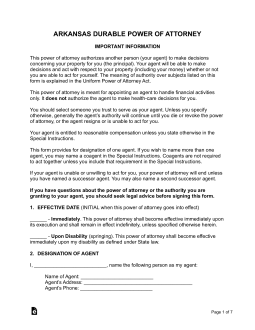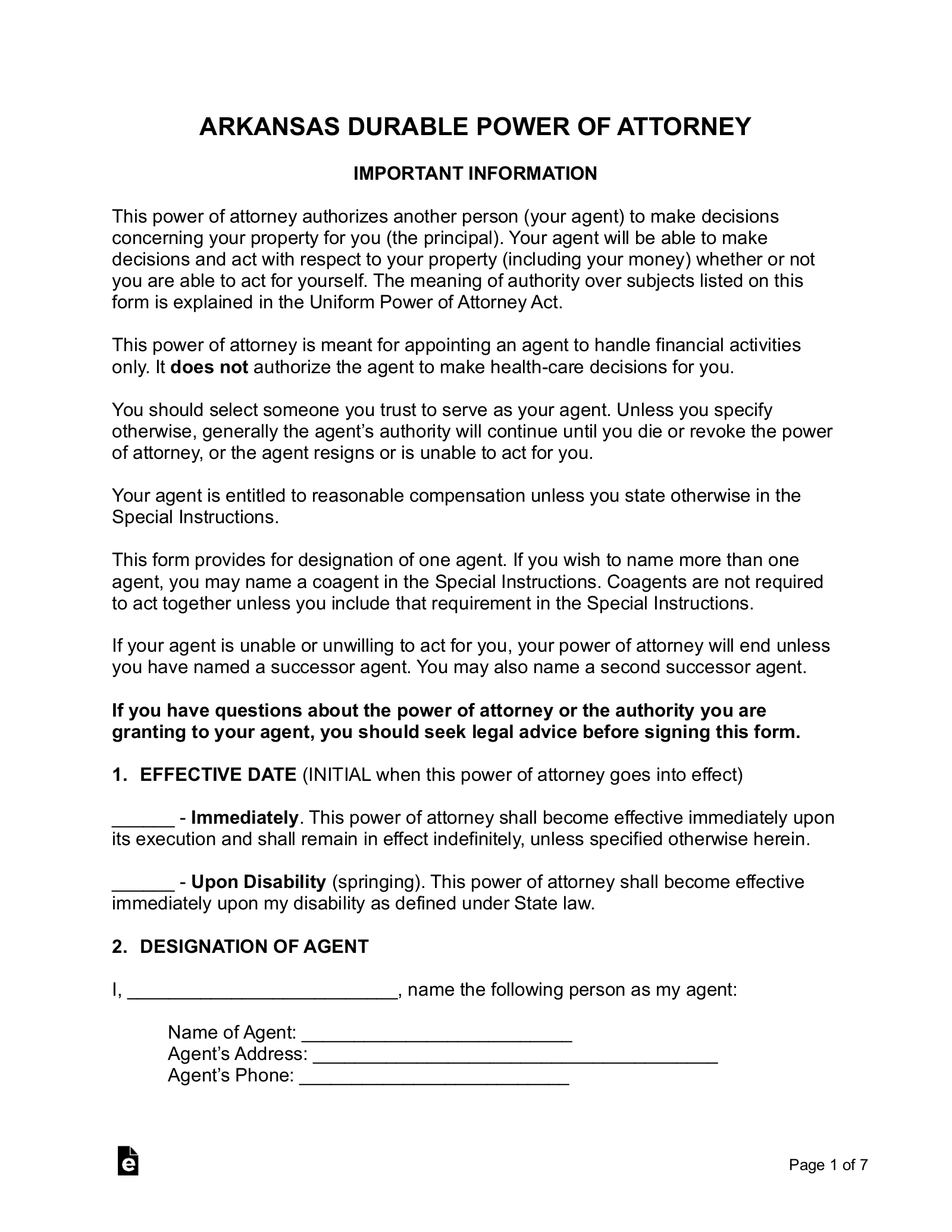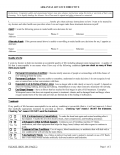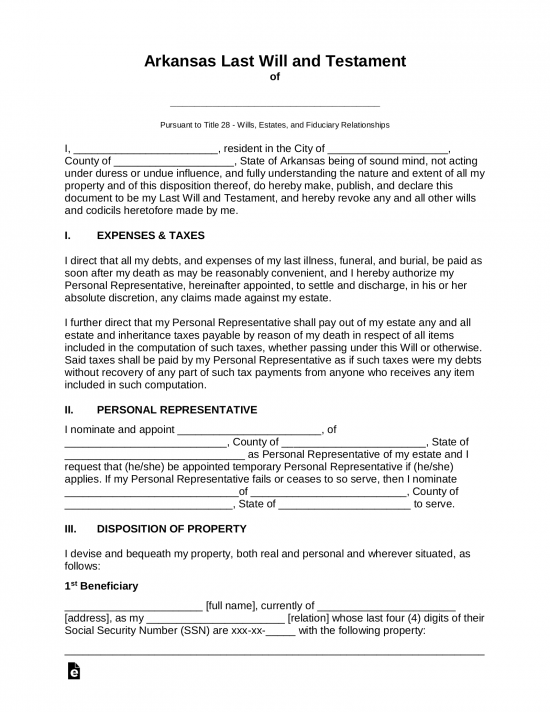Updated April 16, 2024
An Arkansas durable statutory power of attorney form allows a principal to nominate a spouse or trusted relative (“agent”) to handle their financials during their lifetime. The term “durable” means the principal’s incapacity will not void the agent’s powers. The form can only be terminated by the principal signing a revocation or upon their death. If the principal is incapacitated, the only way to terminate is to claim gross negligence by the agent and to seek a court injunction.
Table of Contents |
Laws
Title 28, Subtitle 5, Chapter 68 (Uniform Power of Attorney Act)
Definition of “Durable”
“Durable,” with respect to a power of attorney, means not terminated by the principal’s incapacity (§ 28-68-102(2)).
Definition of “Power of Attorney”
“Power of attorney” means a writing or other record that grants authority to an agent to act in the place of the principal, whether or not the term power of attorney is used (§ 28-68-102(7)).
Signing Requirements
The principal’s signature must be signed in the presence of a notary public. If the agent signs the optional Agent Certification, it must also be notarized (§ 28-68-105, § 28-68-302).
Statutory Form
Arkansas does have a statutory form located at § 28-68-301 of the Arkansas Code.
How to Write
Designation Of Agent
(1) Arkansas Principal. The Arkansas Principal is the individual designating an Agent to make decisions and effect actions in his or her name. Identify the Arkansas Principal granting such authority to an Agent or Attorney-in-Fact.
(2) Name Of Agent. Record the full name of the Agent or the Attorney-in-Fact who will be able to access the principal power in this document to make decisions for the Arkansas Principal.
(3) Agent’s Address.
(4) Agent’s Telephone Number.
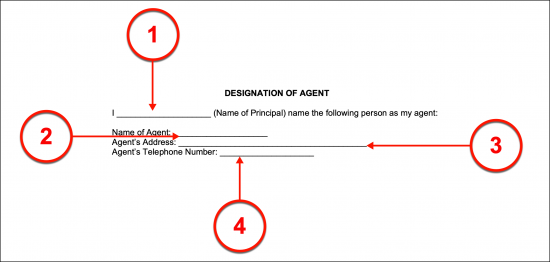
Designation Of Successor Agent(s) (Optional)
(5) Name Of Successor Agent. A scenario where the Attorney-in-Fact or Agent above is unavailable to represent the Principal may occur. This may be the result of the Attorney-in-Fact scheduling conflicts, shift in attitude, or having his or her powers revoked by the Principal. In any case, any of the financial matters requiring the Attorney-in-Fact attention may suffer during such a scenario. Therefore, as a cautionary measure, this document can automatically appoint a Successor Attorney-in-Fact or Successor Agent to step up to the Primary Arkansas Agent (Attorney-in-Fact) role when the original Agent is dismissed, removes himself or herself, or becomes unreliable. Furnish the full name of the Arkansas Successor Agent to take advantage of this precaution. Only the Successor Agent named in this paperwork can take over the Primary Agent role if it becomes vacant.
(6) Successor Agent’s Address.
(7) Successor Agent’s Telephone Number.
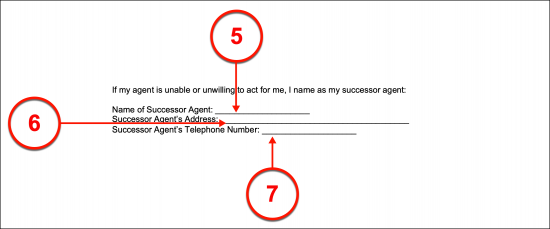
(8) Name Of Second Successor Agent. A Second Successor can be designated to take over the Primary Agent or Attorney-in-Fact role should it become vacant and the First Successor Agent does not fill it.
(9) Second Successor Agent’s Address.
(10) Second Successor Agent’s Telephone Number.
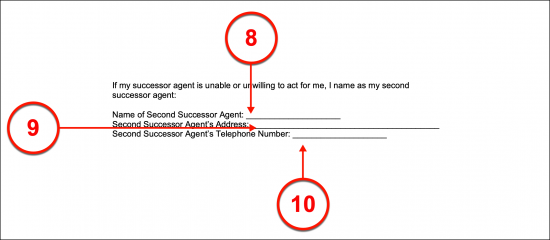
Grant Of General Authority
(11) Real Property. The Arkansas Principal will need to directly approve of the Agent’s ability to represent or make principal decisions over real estate (or Real Property) by initialing the first item in the list of general authority topics.
(12) Tangible Personal Property. The second topic of this list will enable the Agent to engage in decisions and actions over the Arkansas Principal’s physical personal property (not real estate). If the Arkansas Principal intends to grant his or her authority over his or her (physical) property then he or she must initial the second list item.

(13) Stocks And Bonds. The ability to decide over stocks and bonds using the name of the Arkansas Principal can be granted to the Agent once the Arkansas Principal initials the third item.
(14) Commodities And Options. The Attorney-in-Fact can be granted the same authority (held by the Principal) over commodities and options by initialing the fourth item.
(15) Banks And Other Financial Institutions. The Arkansas Principal can expect his or her decisions with banks and financial institutions to be carried out or made by the Agent so long as the fifth topic is initialed by the Arkansas Principal.

(16) Operation Of Entity Or Business. If the Arkansas Principal is responsible for the operation of a Business Entity and wishes to grant his or her Agent the same authority over such an Entity that he or she possesses then the appropriate list item must be initialed by the Arkansas Principal.
(17) Insurance And Annuities. The power to make decisions over the Arkansas Principal’s insurance policies and any principal annuities can be appointed to the Agent or the Attorney-in-Fact abilities if the Arkansas Principal initials the seventh topic.
(18) Estates, Trusts, And Other Beneficial Interests. The Arkansas Principal will need to initial the eighth topic if he or she wishes to give the Agent the principal authority over the estates, trusts, and other beneficial interests under his or her control.

(19) Claims And Litigation. The Arkansas Principal can empower the Agent to make legal claims and even engage in litigation on his or her behalf with the same authority he or she carries by initialing the ninth topic.
(20) Personal And Family Maintenance. Sometimes, the personal financial life of the Arkansas Principal will be tied in closely with his or her family life. To give the Agent principal authority in the family matters of the Principal, the Arkansas Principal must initial the tenth item.
(21) Benefits From Governmental Programs. The Principal’s applications, decisions, and actions over his or her government benefits can be handled by the Agent with the same authority carried by the Arkansas Principal so long as the eleventh topic bears the Arkansas Principal’s initials of approval.
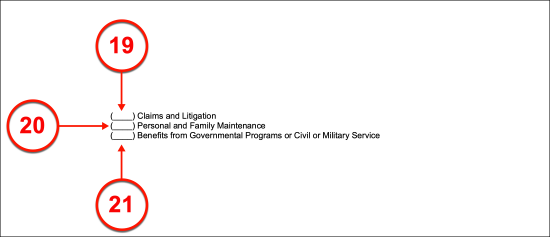
(22) Retirement Plans. The Arkansas Principal can authorize the Agent to handle his or her retirement plans and preparations by initialing the twelfth subject matter.
(23) Taxes. While additional forms may be needed from the Department of Revenue or the IRS, the Arkansas Principal may establish his or her intent to grant the Agent the right to perform tax functions on his or her behalf limited only by this document and what is allowed by law once he or she (the Arkansas Principal) initials the second to last topic.

(24) All Preceding Subjects. The Arkansas Principal may have determined that his or her Agent should have the authority to act on all of the topics presented in this list. If so, then only the final statement from this list should be initialed by the Arkansas Principal. If the full scope of powers defined above will be granted through this statement’s Principal approval, then no other general power defined in this list should be initialed. The Principal has the option of granting all the powers above to the Agent by initialing each one or by initialing this final designation.

Grant Of Specific Authority (Optional)
(25) Inter Vivos Trust. Some principal decisions and actions will need deliberate approval from the Arkansas Principal in being granted under his or her Attorney-in-Fact’s scope of powers. For instance, if the Arkansas Principal controls or has partial control of an inter vivos trust and wishes to appoint the Attorney-in-Fact with the same authority he or she carries over such trusts, the first item in “Grant Of Specific Authority” must bear the initials of the Principal.
(26) Make A Gift. The right to make gifts of principal assets, purchase gifts, make donations, forgive debts, and other actions of gift-giving (that are compliant with § 28-68-217 of the Uniform Power of Attorney Act) in his or her name can be granted by the Arkansas Principal (to his or her Agent) when he or she initials the second item. If there are any limitations that the Arkansas Principal wishes to impose on this authority then they should be documented in the “Special Instructions” section.

(27) Rights Of Survivorship. The Agent can be designated with the ability to create or alter the Arkansas Principal’s survivorship rights and entitlements through the language in the third item. This topic must be initialed by the Arkansas Principal for the Agent to access principal authority in this matter.
(28) Beneficiary Designation. The Arkansas Principal can enable the Agent to handle his or her beneficiary designations by initialing the fourth statement. It is important to note, that the Agent will not be given the ability to terminate any of the Arkansas Principal’s Beneficiary designations through this statement.

(29) Designating Power. The Arkansas Principal’s Agent can be authorized to delegate the authority this document grants to a Third Party if the fifth statement is initialed by the Principal issuing this form.
(30) Waiving Principal’s Beneficiary Rights. The Arkansas Principal should initial the sixth statement if he or she is entitled to beneficiary rights or anticipates being designated as a Beneficiary and wishes to grant the Agent the power to waive such rights in his or her name.
(31) Principal Fiduciary Powers. The final statement of this section will grant the Agent with the same fiduciary powers at the Arkansas Principal’s disposal once it is initialed by the Principal. These powers (as well as any others in this document) can be limited or controlled using the next section.
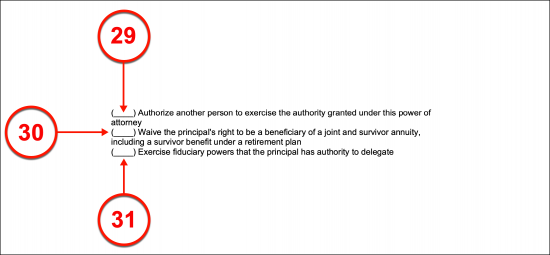
(32) Optional Instructions. The Arkansas Principal may wish to limit the scope of his or her Agent’s authority over principal matters, may wish to place conditions on when such authority may be accessed or may wish to restrict the Agent from taking care of certain matters within an approved power. All limitations and instructions the Arkansas Principal wishes to include with this designation of power should be documented in the “Special Instructions” section.

Nomination Of Guardian (Optional)
(33) Nominee For Conservator Or Guardian Of Arkansas Principal Estate. The Arkansas Principal can use this paperwork to nominate a Conservator over his or her estate should Arkansas Courts deem this a necessity. To make such a nomination, the Nominee’s full name, address, and telephone number should be presented.
(34) Nominee For Conservator Or Guardian Address.
(35) Nominee For Conservator Or Guardian Phone Number.

(36) Nominee For Guardian Of Arkansas Principal. Arkansas Courts may decide that the Principal has been incapacitated and requires a Court-Appointed Guardian. The Arkansas Principal can nominate the identity of this role to the Courts by providing the Guardian Nominee’s entire name, complete address, and current telephone number where requested.
(37) Address Of Guardian Nomination.
(38) Telephone Number Of Guardian Nomination.

Signature And Acknowledgment
(39) Arkansas Principal Signature. The Arkansas Principal will need to sign this appointment of power while a Notary Public watches.
(40) Signature Date Of Arkansas Principal. The date that this appointment is signed by the Arkansas Principal should be presented during the signature process.
(41) Printed Name And Address. The printed name of the Arkansas Principal and his or her address are the final items of submission required of the Principal to complete the signature process.

Notary Public
(42) Arkansas Notarization. The Arkansas Notary Public responsible for notarizing the Principal’s signature shall display the notarization process in the final area of the signature section.
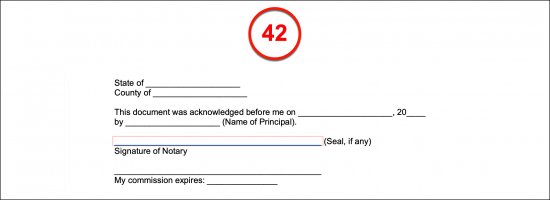
Related Forms
Download: PDF
Download: PDF, MS Word, OpenDocument

